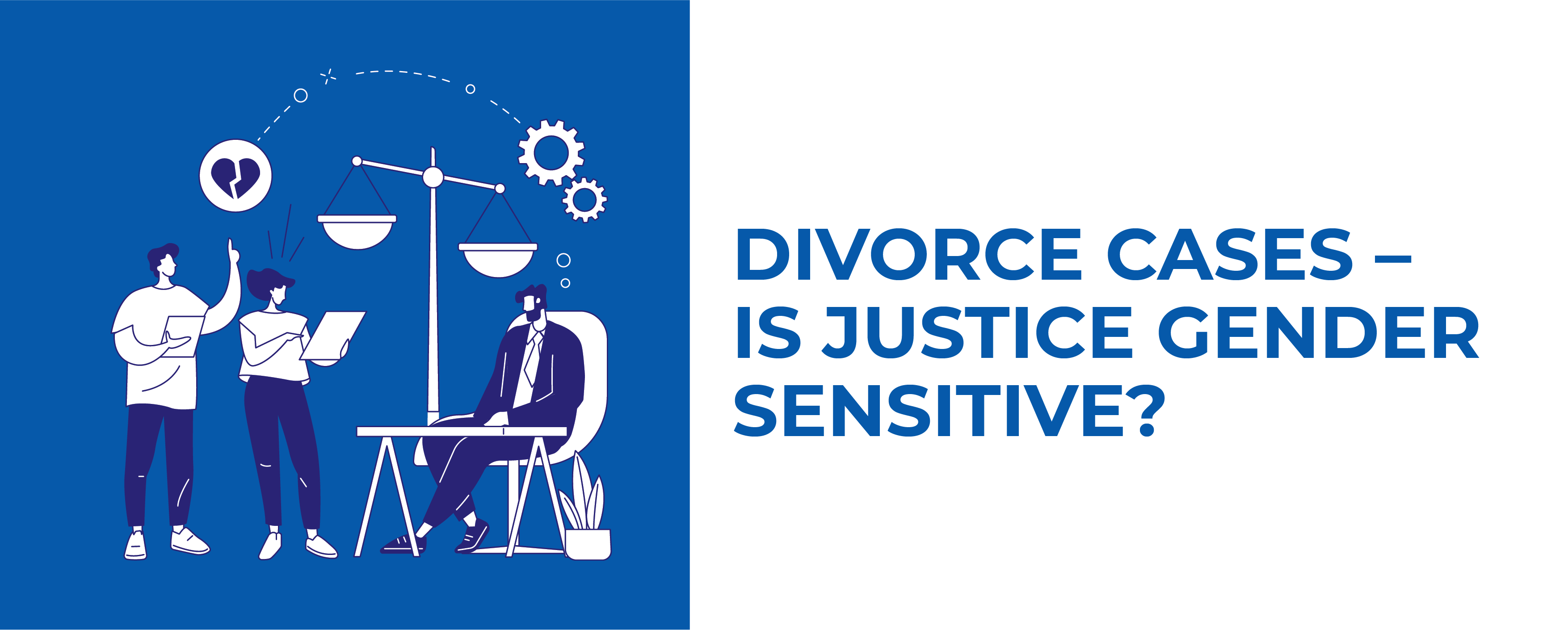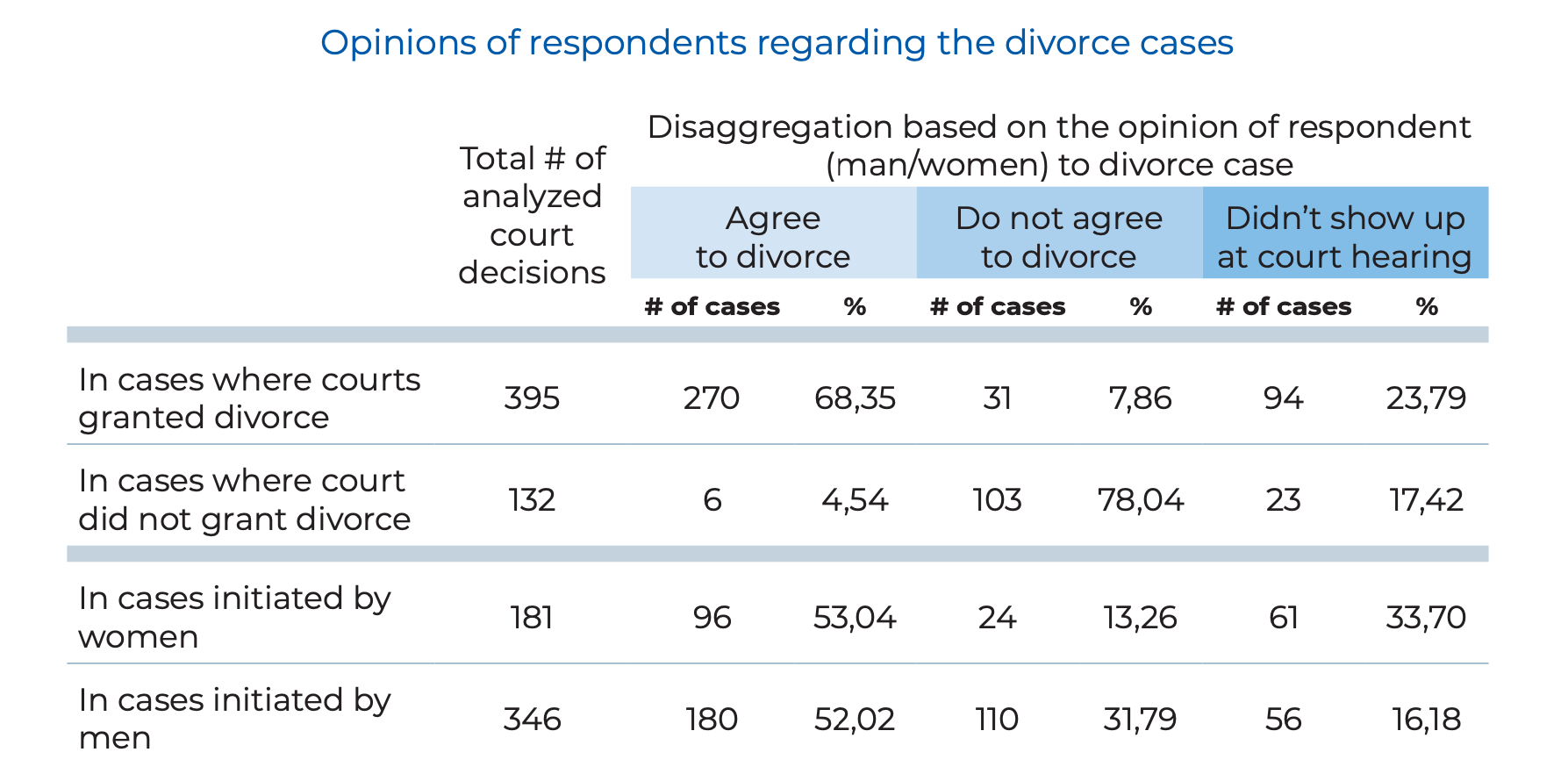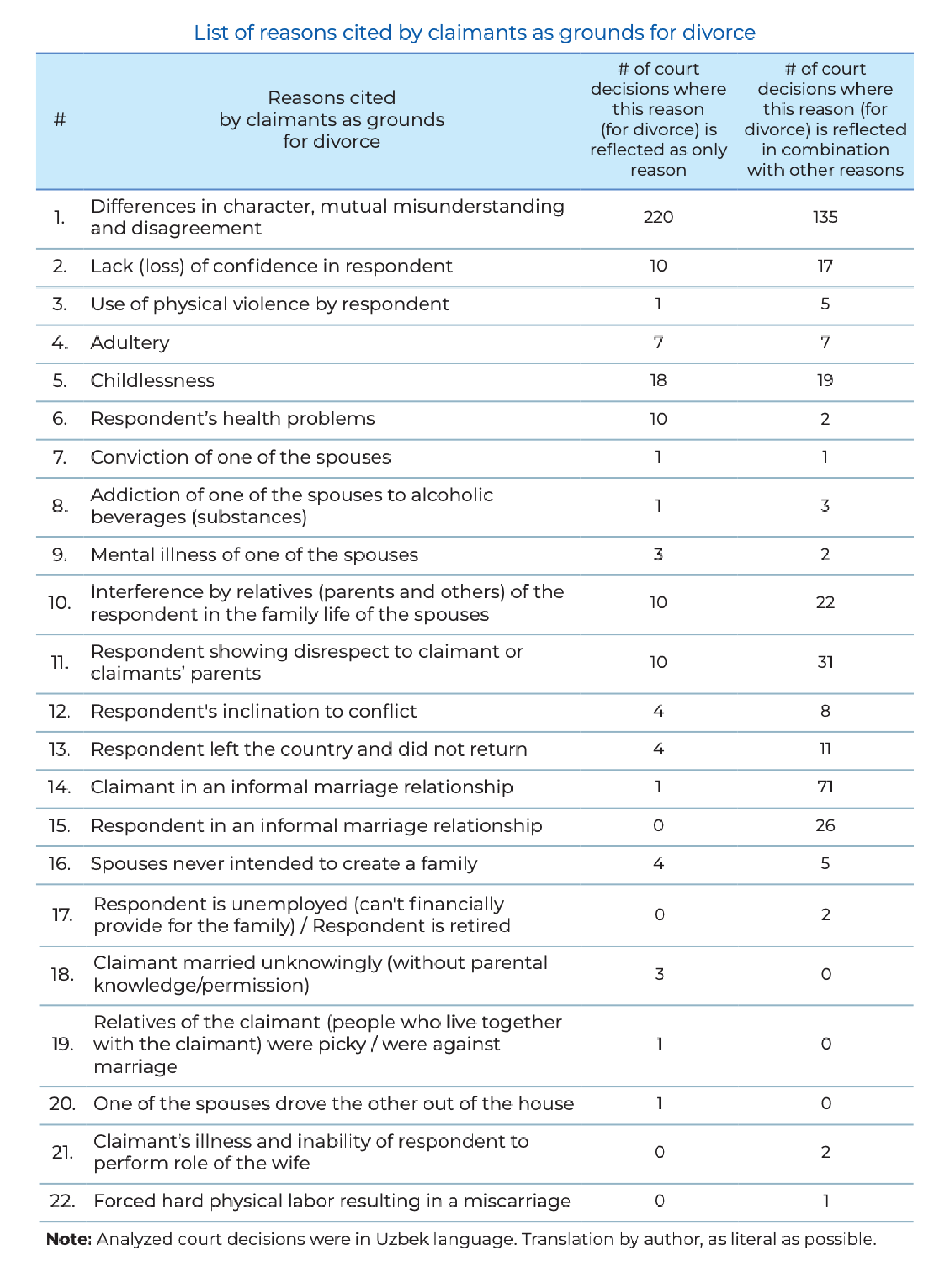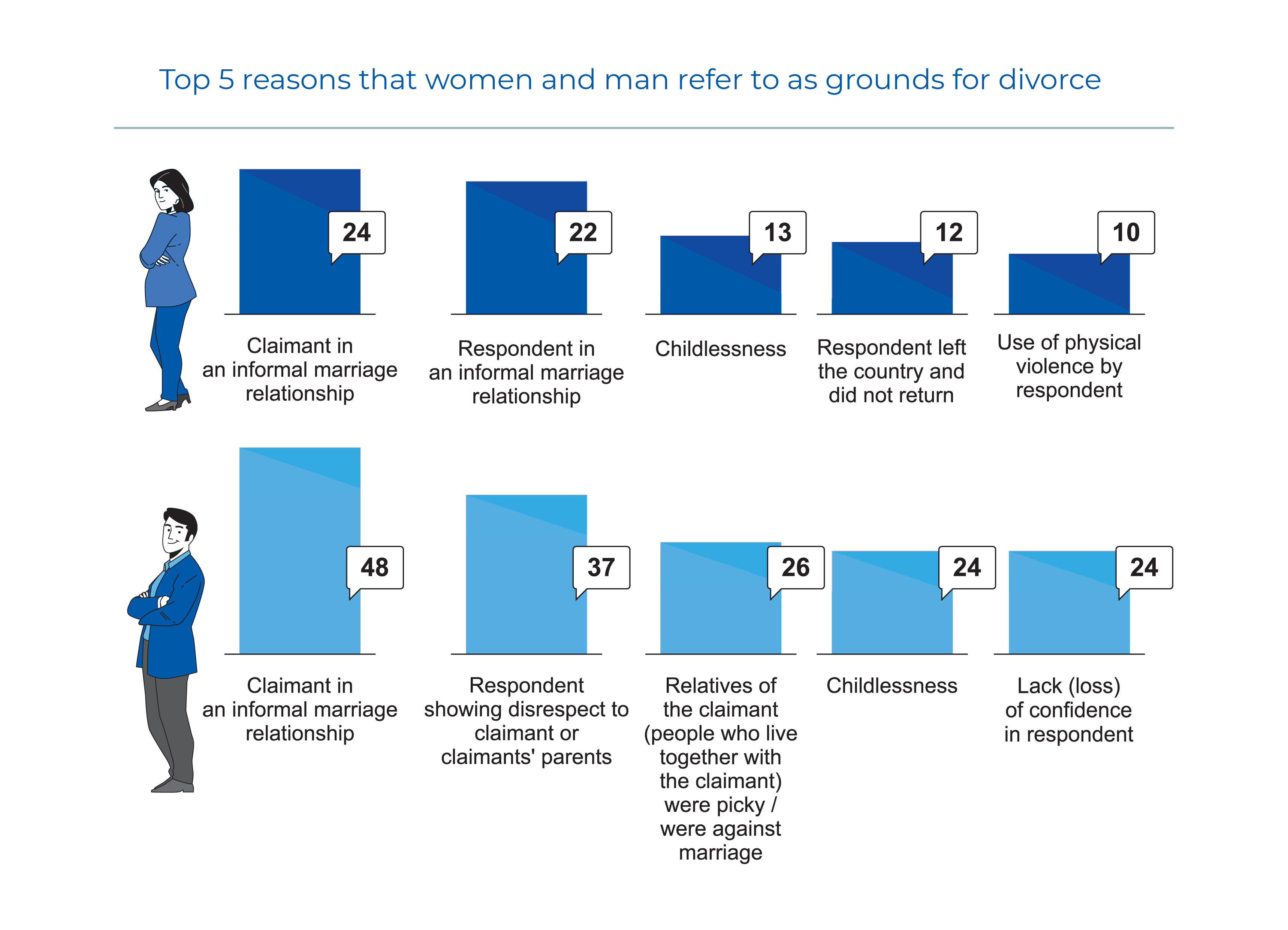Divorce cases – is justice gender-sensitive?
October 3, 2023

Introduction
Uzbekistan has made significant efforts since 2017 to protect women's rights and promote their active participation in society. Recent developments in the country highlight these ongoing initiatives. In this blog post, we will delve into the judicial practices concerning women's rights in Uzbekistan, with a particular focus on cases involving women as claimants or respondents.
Analyzing Court Activities
To conduct our analysis, we reviewed the statistical report on court activities available on the Supreme Court's website. These reports offer valuable insights into different court types, time periods, and other relevant factors, presenting statistical data in tabular form. However, it's crucial to note that the available statistical reports lack comprehensive gender-disaggregated data, which is essential for assessing women's access to justice.
Insights from Statistical Data
Out of the 497 statistical forms analyzed, only seven provide gender-disaggregated information. This falls short of the recommendations set by the UN Committee on the Elimination of all forms of Discrimination against Women (CEDAW) General Recommendation #33, which emphasizes the need for comprehensive data on women's access to justice. To align with international standards, the Supreme Court should develop additional statistical forms that collect gender-disaggregated data automatically using modern IT tools implemented in courts. UNDP under its ‘Rule of law Partnership in Uzbekistan” project has provided support to Supreme court in developing and piloting an e-justice system, that included publication of court decisions on the website, which also allows interested scholars to conduct independent research on judicial practice.

Examining Divorce Cases
To gain insights into how courts handle cases involving women's rights, we focused on 527 court decisions related to divorce. Divorce cases were chosen due to their significance in accessing justice and the notable increase in their numbers. The accessibility of justice as well as availability and transparency of gender-disaggregated justice data aligns with UNDP’s overall commitment to ensure gender equality. UNDP in Uzbekistan has been supporting Government of Uzbekistan in increasing accessibility of justice for women and representation of women in judiciary. In 2019 UNDP supported National Statistical committee in launching a separate gender.stat.uz website where gender disaggregated data was compiled. In addition, in 2020 UNDP prepared ‘Best foreign experience in increasing women representation in judiciaries’ report which resulted in introducing gender quotas for women in Higher School of Judges.
Rise in Divorce Cases
The number of divorce cases has been on the rise since 2020. Compared to the previous year, divorce cases grew by 16% in 2021 and over 50% in 2022 (see Table 2).

Granting Divorces
Civil courts granted divorces in 74.95% of cases and refused in 25.04%. This trend is consistent with the annual statistics, with courts granting divorces in 52.79% of cases in 2021 and 58.54% in the first nine months of 2022.
Gender Disaggregation in Divorce Cases
Out of the 527 analyzed cases, 34.35% were filed by women and 65.65% by men. Courts granted divorce more frequently when the claims were filed by women, with a success rate of 86% compared to 69% for men (see Table 3).

Considering Respondents' Opinions
Courts generally take into account the opinions of respondents in divorce hearings. In cases where divorce was granted, respondents did not oppose divorcing in 68.35% of cases, refused in 7.86% of cases, and did not show up for court hearings in 23.79% of cases. In cases where divorce was not granted, respondents refused in 78.04% of cases, did not oppose divorcing in 4.54% of cases, and did not attend court hearings in 17.42% of cases (see Table 4).

The Issue of Physical Violence
It is crucial to address the issue of physical violence in divorce cases. Out of the 10 cases filed by women-claimants where 'use of physical violence by respondent' was cited as a reason for divorce, courts granted divorce in only 4 cases. In the remaining 6 cases, courts refused to grant divorce, potentially leaving women in abusive situations. The courts did not conduct additional investigations into the allegations of violence, and respondents often did not respond to these claims. To ensure the safety of women, courts should take measures to minimize the risk of further violence by considering protection orders and providing safe spaces. Hopefully, the situation will change drastically after 2023, when Uzbekistan adopted the new legislation criminalizing domestic violence.

Based on this analysis, we produced several key conclusions:
Civil courts in Uzbekistan demonstrate greater responsiveness to the needs of women, both as claimants and respondents. However, continuous efforts should be made to ensure gender equality in access to justice.
The analysis of divorce cases is limited, representing less than 1% of all divorces handled by civil courts in 2021. To gain more comprehensive insights, the Supreme Court should develop new statistical forms that collect gender-disaggregated data automatically.
Civil courts need to prioritize addressing allegations of physical violence in divorce cases, ensuring the safety and well-being of women. Additional protective measures, such as restraining orders, should be considered.
The consequences of divorce, including child custody, division of property, and financial support, require greater attention in court proceedings. By addressing these issues effectively, civil courts can reduce the likelihood of future disputes and ensure the fair treatment of all parties involved.

The grounds for divorce, such as informal marriage relationships and childlessness, can significantly impact the reconciliation process. It is important for courts to consider these factors and their potential effects on the individuals involved.


Revisiting the reconciliation period requirements established by legislation could lead to more efficient and fair divorce proceedings. Identifying situations where courts are free to proceed without a reconciliation period can expedite the resolution of cases and alleviate the burden on the court system.
By working with national governments, civil society organizations, and other stakeholders, UNDP aims to address the root causes of gender-based violence, including gender-based discrimination and unequal power relations, and support the development of policies and legislation that protect women and girls from violence. This research is part of this work and we hope that conclusion of this research will lead to the revision of legislation (both procedural and subject matter) to further improve protection of rights of women.
In conclusion, by implementing these recommendations and prioritizing the protection of women's rights, Uzbekistan can further enhance its judicial practices and ensure equal access to justice for all individuals, regardless of gender.
By implementing these recommendations and prioritizing the protection of women's rights, Uzbekistan can further enhance its judicial practices and ensure equal access to justice for all individuals, regardless of gender.Azamat Salaev, Project Manager of the ‘Strengthening Rule of Law and Human Rights Protection in Uzbekistan’ project

 Locations
Locations
